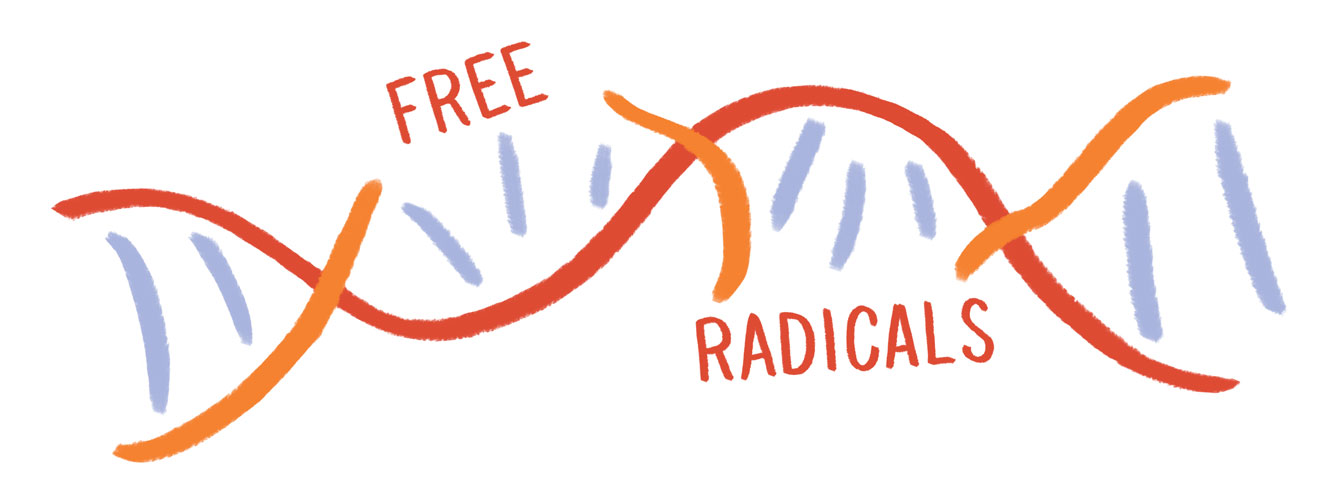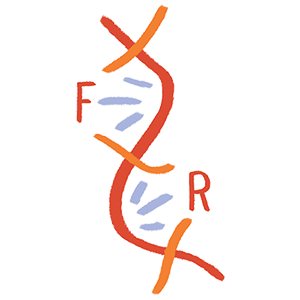
A digital illustration of DNA strands.
When will scientists learn to say no to eugenics?
Dear Science Magazine Editorial Staff,
We are writing in response to your recent article “Modern humans lost DNA when they left Africa—but mating with Neandertals brought some back.” We were deeply concerned by the language of the piece, which expressed dated and eugenic sentiments about “African” DNA. Beginning in the first paragraph, Gibbons characterizes “African variants” as a “burden” that “seem to boost the risk of becoming addicted to nicotine and having wider waistlines.” Throughout the piece, statements like these were presented without nuance, and seemingly without any recognition of how similar language has been used to justify racist, colonial, and imperialist policies and violence.
Most troubling is this section: “But today’s humans might prefer to shed some of them [i.e. the “African variants”]. So far, Capra’s team has found three functional variants, which are associated with addiction to nicotine, a wider waistline, and skin pigmentation.” Here, Gibbons takes an explicitly eugenic stance, advocating for “shedding” genes associated with skin pigmentation. Additionally, she reinforces racist associations between “African” DNA and socially stigmatized traits, including risk of obesity and addiction. Decontextualized claims like Gibbon’s perpetuate harmful narratives that pathologize communities of color and contribute to anti-black racism and notions of white supremacy.
We ask that you retract this article and publish a statement apologizing for its offensive characterizations and generalizations about “African” DNA. As we all know, the study of evolution has a fraught history steeped in racism and inextricably linked to eugenics. Contemporary science in the field of population genetics, and especially human evolution, cannot escape this legacy without explicitly acknowledging this history. At the very least, it cannot continue to carelessly promulgate racist narratives that insinuate the inferiority of “African” DNA.
Sincerely,
Sophie Duncan (University of British Columbia, MSc Geography Candidate)
Ryan Greene (Brown University, BA Health & Human Biology & BA Literary Arts)
Hannah Duncan (Yale Law School ’21)
Aleksandra Karapetrova (Northwestern University, Interdisciplinary Biology Sciences PhD candidate)
Additional Signatories
Nicoletta Christina Browne (Pomona College ’15, BA Chemistry)
Hye Young Choi (UCSD ‘17, BS Biochemistry/BA Global Health)
Sophie Wang (Pomona College ’14, BA Biology; UCL ’18, MSc Science, Technology & Society)
Alexis Takahashi (Pomona College, B.A. Neuroscience)
Anna Khatt (UCLA ’15, BS Microbiology, Immunology & Molecular Genetics)
Joseph Dwork (UMass Amherst ’16, Environmental Science)
Mariah-Rose McClaren
Adam Blaustein Rejto (Hampshire College ’17, B.A. Moleculer Biology)
Andreas Kontonicolas (King’s College London ’15, BSc Biomedical Sciences)
Mr. Tahil Sharma (Hindu Religious Director at the University of Southern California, Board Member of the Southern California Committee of the Parliament of the World’s Religions)
Danie Yun Diamond-Melendez (BA Neuroscience ’16)
Linus Kuo (Pomona College ’13, B.A. Psychology)
Nafeesa Andrabi (UNC Chapel Hill, PhD student in Sociology)
Tiffany Do (UCLA ’14, B.A. Anthropology, Geography)
Taiji Miyagawa
Taylin Im (BA Health & Human Biology, Brown University ’15; MD Candidate, Loma Linda University ’19)
Carly Margolis
Jessica Ng (Scripps College ’15, BA Physics; Scripps Institution of Oceanography, PhD student)
Mario Pizarro Rojas (UCLA ’15, MIMG B.S., CSULA ’18 Biochemistry MS)
Sofia Rudin
Michelle Barboza (University of Florida)
Ravi Sachidanandam (Icahn School of Medicine at Mount Sinai)
Jeremiah Yarmie (B.Sc. (Hons) Genetics & Biochemistry, University of Manitoba)
Pi Delport (Frontier Lab, Cape Town)
Kevin Chung (Pomona College, B.A. Neuroscience)
Alexandra Sanchez (Pomona College ’17, B.A. Biology)
Chaelee Dalton (Pomona College ’19, B.A. Physics)
Feodora Rayner (UCL)
Sohum Chokshi (Brown University)
Dr. Melissa Petreaca (DePauw University)
Arabella Turek (UCL ’16, BSc Biomedical Sciences; UCL ’18, MSc Science, Technology & Society)
Professor Rasigan Maharajh (Institute for Economic Research on Innovation, Tshwane University of Technology)
Nafis Hasan (PhD Candidate at Sackler School of Graduate Biomedical Sciences, Tufts University)
Lisette Torres-Gerald (Nebraska Wesleyan University)
Eric Lawton (M.A. Cambridge, Maths, philosophy)
Divya M. Persaud (B.A. Geology, University of Rochester; University College London ’21)
Dr. Britt Rusert (W. E. B. Du Bois Department, UMass Amherst)
Laura Hagerty (University of Florida B.S. 2015, biology)
Heidi Stauffer (University of California, Santa Cruz, ‘17, PhD Earth Sciences)
Bethlehem Desta (Brown University, Ethnic Studies)
Madeleine Straubel (UNC Chapel Hill PhD Student in Sociology)
Julia Travers (Science Writer, BA, Literary and Cultural Studies, College of William and Mary)
Leigh Marks (Pomona College ’15, B.A. Environmental Biology)
Mark Kim (NYU/Rutgers)
Dr. Heather Natola (University of Rochester, Neuroscience ’17)
Janice Gan (Brown University ‘17.5, B.A. Environmental Studies)
Cassidy Henry (UCLA Linguistics, student)
Jennifer Hamilton (Hampshire College, Associate Professor of Legal Studies and Anthropology)
Jana B. Turk (M.A. Intercultural Encounters & Study of Religions ’17, University of Helsinki)
Reilly Spitzfaden (Eastman School of Music, 1st year PhD)
Katherine Gould (Pasadena City College)
Rowena Hann (UC Berkeley, Molecular Environmental Biology, 2014, and Touro University, Doctor of Osteopathy Candidate, 2021)
Maria Caruso (B.A Biology, Pomona College )
Samantha Chappell (University of California, Los Angeles)
Isabelle Edwards (Brown University, Class of 2015)
Melissa Soriano (California State University Channel Islands, ’17 B.A. Chemistry)
Wendy Cole (MS University of Vermont 2013)
If you would like to add your signature to this open letter, please fill out this form!







